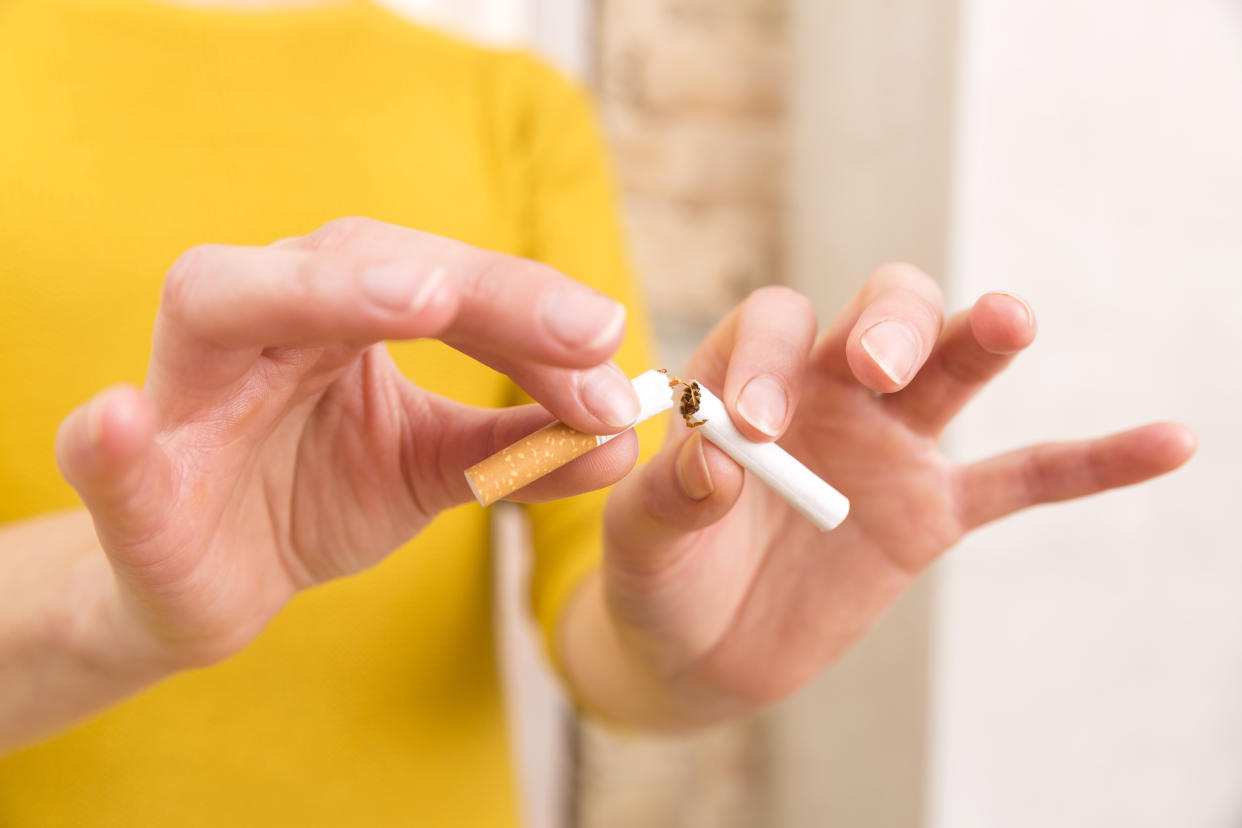‘It’s never too late’ to quit smoking with some 'lung cells showing no damage a few years after ditching the habit’

Scientists stress it is “never too late” to quit smoking.
A team from University College London (UCL) analysed the DNA of more than 600 lung-tissue cells.
READ MORE: Why your social smoking habit is more unhealthy than you think
Among the smokers, over nine in 10 samples contained up to 10,000 genetic mutations that could trigger cancer.
Ex-smokers were found to have four times more “healthy cells” that those who still lit up, putting them on par with people who have never used cigarettes.
“People who have smoked heavily for 30, 40 or more years often say to me it’s too late to stop smoking, the damage is already done,” co-author Dr Peter Campbell, from the Wellcome Sanger Institute, said.
“What is so exciting about our study is it shows it’s never too late to quit.
“Some of the people in our study had smoked more than 15,000 packs of cigarettes over their life, but within a few years of quitting many of the cells lining their airways showed no evidence of damage from tobacco.”
Around 47,200 people get diagnosed with lung cancer every year in the UK, Cancer Research UK statistics show.
In the US, about 234,030 cases were discovered in 2018, according to the American Lung Association.
More than seven in 10 lung-cancer cases are caused by smoking, the NHS reports.
Tobacco smoke contains over 60 carcinogenic chemicals.
Getting through 25 cigarettes a day is said to increase a smoker’s risk of lung cancer by 25 times.
The “best way” to ward off the disease is to quit smoking “as soon as possible”, according to the NHS.
READ MORE: Men who regularly smoke cannabis have increased risk of developing testicular cancer, study claims
To learn more, the scientists took lung biopsies from 16 people, including smokers, ex-smokers, never-smokers and children.
While the cells in the samples were not diseased, those from smokers had significantly more pre-cancerous genetic changes.
Results, published in the journal Nature, reveal more than a quarter of the damaged cells had at least one cancer-causing mutation.
“We found even these healthy lung cells from smokers contained thousands of genetic mutations,” co-lead author Dr Kate Gowes, from UCL, said.
“These can be thought of as mini time-bombs waiting for the next hit that causes them to progress to cancer.”
Among the ex-smokers, a “sizeable group” of cells lining the airways showed no genetic damage.
While these cells may repair themselves, damage deeper in the lungs could be irreversible.
This can lead to emphysema, where the air sacs become damaged, leading to shortness of breath, according to Mayo Clinic.
READ MORE: US tells smokers to 'stop vaping': what are the health implications of e-cigarettes?
“Our study has an important public health message and shows it really is worth quitting smoking to reduce the risk of lung cancer,” study author Professor Sam Janes, from UCL, said.
“Stopping smoking at any age does not just slow the accumulation of further damage, but could reawaken cells unharmed by past lifestyle choices.
“Further research into this process could help to understand how these cells protect against cancer and could potentially lead to new avenues of research into anti-cancer therapeutics.”
The study was part of the £20m ($26m) Mutographs of Cancer project, a Cancer Research UK Grand Challenge initiative.
It aims to detect DNA “signatures” that indicate damage, enabling scientists to better understand the causes of lung cancer.
“It’s a really motivating idea that people who stop smoking might reap the benefits twice over - by preventing more tobacco-related damage to lung cells and by giving their lungs the chance to balance out some of the existing damage with healthier cells,” Dr Rachel Orritt, from Cancer Research UK, said.
“What’s needed now are larger studies that look at cell changes in the same people over time to confirm these findings.
“The results add to existing evidence that, if you smoke, stopping completely is the best thing you can do for your health.
“It’s not always easy to kick the habit, but getting support from a free, local Stop Smoking Service roughly triples the chance of success compared to going it alone.”


